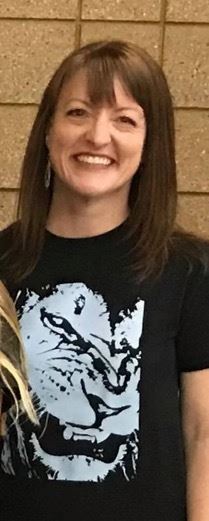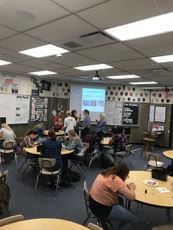 School name: Woods Cross High School
School name: Woods Cross High School
Type of college/university: Suburban high school
School locale: 13 miles north of Salt Lake City)
Classes you teach: AP Psychology, Introductory Psychology, Quest (a credit recovery course for students to help them get on track to graduate)
What’s the best advice about teaching you’ve ever received?
The best advice I ever got as a teacher was during my student teaching. Pam Olson, my coordinating teacher for math (I taught math for 15 years) told me that the best thing a teacher can do is let go of her ego. She went on to discuss how teachers who struggle often get caught up in battles of ego. Egos affect interactions with students or colleagues or parents. If you can let go of your ego, you can avoid all kinds of problems. I have found this to be such sage advice. When difficulties have arisen for me as a teacher, it usually goes back to ego issues more than anything else. I also find that I can have a much better relationship with my students when I check my ego at the door.
What book or article has shaped your work as a psychology teacher?
In all honesty, it was the Myers Psychology textbook (maybe 2e) that my AP Psychology teacher adopted in 1992. In the spring before my senior year of high school, my psychology teacher came to me and asked me to look over a set of three textbooks to help him choose the best book for a new class that would be offered the following year – AP Psychology! I distinctly remember looking those books over very carefully. As a junior in high school, I knew I loved psychology. However, helping to select that text and subsequently taking the first AP Psychology class my senior year, solidified my decision to major in psychology and become a teacher. I read the text cover to cover my senior year, not because it was required, but because I could not get enough. When I began teaching AP Psychology eight years later, I was THRILLED to recognize the author, his unique and funny voice, and a newer edition of the book I had loved. David Myers’ texts have shaped my courses and helped lead me to make the decision to become a high school psychology teacher.
Briefly tell us about your favorite lecture topic or course to teach.
My students joke that I start every unit with the statement, “This is my favorite unit to cover in psychology.” Their joke has merit. It is REALLY hard for me to pick just one. Every unit has its own fun activities and demonstrations and applications to real life. Just when I start to tire of a topic, it’s time to move on to another “favorite” unit.
Briefly describe a favorite assignment or in-class activity.
As stated above, where do I begin? I have been to so many amazing workshops and conferences. I have had the pleasure of learning from so many phenomenal teachers. I have a favorite activity with every unit. My “go to” favorites are usually the ones that don’t take very long and really help the kids to deeply process the information. I’ve listed a few below, but I could go on and on and on:
Neurinal (field trip to the bathroom to demo the neuron), Pavlov and lemonade (this one quick demonstration works better than anything else to teach classical conditioning concepts and kids never forget), Andrea Yates article to teach perspectives and writing FRQ’s for AP, M & M’s to teach statistics, using social media to dispel the myth that we only use 10% of our brain.
What teaching or learning techniques work best for you?
I use many different cooperative learning techniques. My classroom has nine tables of four and from the first day of class, my students learn about the necessity of discussion. They speak the language of psychology daily through small group, partner, or whole class discussions. I am also very structured in this approach, which helps the students and me to stay focused. They number off and take turns. Everyone has to contribute. A quiet class or a class where I lecture the entire time is very much out of my comfort zone. I also make my students get out of their seats and move every 20 minutes for at least 30 seconds. I have a variety of strategies for doing this. I believe it really helps with the climate of the class, the comfort of the kids, and the ability to process information.
 What’s your workspace like?
What’s your workspace like?
My classroom has nine tables of four. I set things up from the “front” where I have a screen and a computer. However, I constantly walk around the room and monitor or participate in discussions. When I’m planning lessons and grading, I have my own desk, table, and computer off to the side in a corner. Though, I rarely sit at my desk when students are there.
Three words that best describe your teaching style.
I asked students to help me with this: Passionate, Organized, Energetic
What is your teaching philosophy in 8 words or fewer?
Love the students, love the subject, take risks!
Tell us about a teaching disaster (or embarrassment) you’ve had and how you dealt with the situation.
I have certainly had embarrassing moments that I was just able to laugh off, like walking around with my shirt tucked into my underwear for an entire class. I even walked into the class next door to take photos in order to use up a roll of film (yes, I have photo evidence) and showed off my underwear to a second class. A kind student took pity on me and told me at the VERY end of class.
I also had a glitch one day teaching functions in math. I could not say the word “function”. I kept dropping the first n in the word. The more I tried to say the word, the more I fumbled to pronounce it correctly. It was a disaster. The poor students couldn’t focus and I had to do the entire lesson over again the next time. I just had to let my ego go, laugh at myself, apologize to the kids, and move on.
What is something your students would be surprised to learn about you?
I still get nervous before the first day of any class. I have two tattoos
What are you currently reading for pleasure?
I just finished Eleanor Oliphant is Completely Fine by Gail Honeyman and started The Hate U Give by Angie Thomas.
What tech tool could you not live without?
Projector, clicker, and PowerPoint (boring, yes, but PowerPoint structures my classes and contains clips or prompts for discussions, demonstrations, and activities)
What’s your hallway chatter like? What do you talk to colleagues about most (whether or not it is related to teaching/school)?
We talk about students, parents, other faculty members as well as our own kids and pets. I share a back room and eat lunch with a big group of English and math teachers. We usually talk about the math and English departments and each other. We are great friends.
